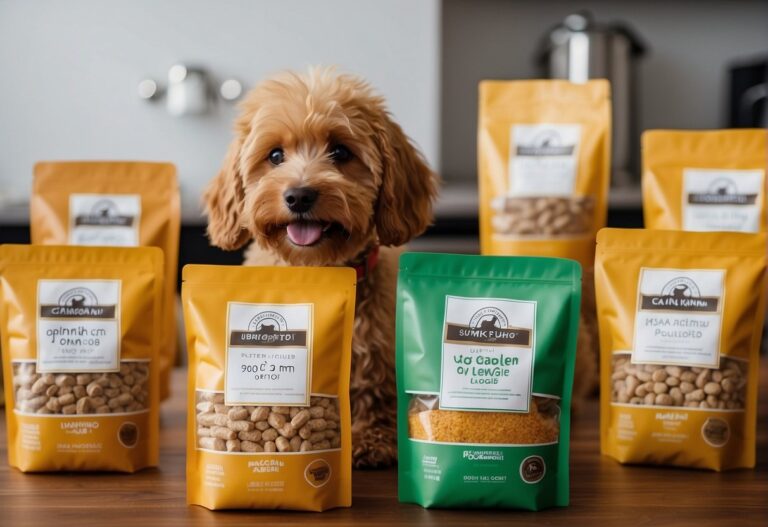Is Your Miniature Goldendoodle Allergic to Human Foods? Signs And Symptoms.

If you are a Miniature Goldendoodle owner, you might be wondering whether your furry friend is Miniature Goldendoodle Allergic to Human Food. While Miniature Goldendoodles are generally healthy and low-maintenance dogs, they can still be susceptible to allergies, including food allergies. Identifying food allergies in your Miniature Goldendoodle is important to ensure their health and well-being.
Recognizing Allergic Reactions in Miniature Goldendoodles
Food allergies in Miniature Goldendoodles can manifest in many ways, including skin rashes, hives, itching, and gastrointestinal issues. Some common symptoms of food allergies in dogs include vomiting, diarrhea, and excessive flatulence. These symptoms can also be caused by other underlying health conditions, so it is important to consult with your veterinarian to rule out any other potential causes.

Common Symptoms of Food Allergies
Food allergies in Miniature Goldendoodles can cause a variety of symptoms. Some of the most common symptoms include itchy skin, vomiting, and ear infections. If your dog is scratching excessively, biting or licking their paws, or rubbing their face against furniture, they may be experiencing itchy skin.
Vomiting is another common symptom of food allergies in dogs. If your Miniature Goldendoodle vomits after eating a certain food, they may be allergic to that food. Ear infections are also common in dogs with food allergies. If your dog is shaking their head or scratching their ears, they may have an ear infection.
Differentiating Between Food and Environmental Allergies
It can be difficult to differentiate between food and environmental allergies in Miniature Goldendoodles. Environmental allergies are caused by allergens in the environment, such as pollen or dust mites. Symptoms of environmental allergies can include hives, difficulty breathing, and anaphylaxis. If your dog is experiencing any of these symptoms, it is important to seek veterinary care immediately.
One way to determine if your dog is allergic to human foods is to eliminate certain foods from their diet and see if their symptoms improve. You can also have your dog tested for food allergies by a veterinarian. A blood test or skin prick test can help determine if your dog is allergic to certain foods.
Potential Miniature Goldendoodle Allergic to Human

If you are concerned that your miniature Goldendoodle may be allergic to human foods, it is important to be aware of the potential allergens that are commonly found in human foods. Some of the most common allergens include proteins, dairy products, grains, and other common allergens.
Proteins and Dairy Products
Proteins and dairy products are some of the most common allergens found in human foods. Chicken, beef, and eggs are all common sources of protein that can cause allergic reactions in some dogs. Dairy products, such as milk, cheese, and yoghurt, can also cause allergic reactions in some dogs.
Read More: Why Your Goldendoodle Won’t Eat: Top Fixes and Causes Explained
If you suspect that your miniature Goldendoodle is allergic to proteins or dairy products, it is important to avoid feeding them these foods. Instead, try feeding them foods that are free from these ingredients, such as fruits and vegetables.
Grains and Other Common Allergens
Grains, such as wheat, and other common allergens, such as soy, can also cause allergic reactions in some dogs. If you suspect that your miniature Goldendoodle is allergic to these ingredients, it is important to read food labels carefully and avoid feeding them foods that contain these ingredients.
In addition to grains and soy, other common allergens that can cause allergic reactions in some dogs include corn, pork, fish, rice, barley, rabbit, kidney beans, and tomatoes. If you suspect that your miniature Goldendoodle is allergic to any of these ingredients, it is important to avoid feeding them foods that contain these ingredients.
Management and Treatment of Food Allergies

If you suspect that your Miniature Goldendoodle is allergic to human foods, it is important to take action to manage and treat their allergies. Here are some steps you can take.
Dietary Adjustments and Alternatives
One of the most effective ways to manage food allergies in dogs is to adjust their diet. This may involve eliminating certain foods from their diet that are causing an allergic reaction. You may also want to consider feeding your dog hypoallergenic dog food, which is specially formulated to be less likely to cause allergic reactions.
Medical Interventions for Allergic Reactions
If your Miniature Goldendoodle experiences an allergic reaction to human food, there are medical interventions that can help. Antihistamines are often used to treat mild allergic reactions, while corticosteroids may be prescribed for more severe reactions. In some cases, your veterinarian may recommend immunotherapy, which involves exposing your dog to small amounts of the allergen over time to build up their immune system’s tolerance.
Goldendoodle Genetics and Allergy Predispositions

If you’re a Miniature Goldendoodle owner, you may be concerned about your pup’s susceptibility to allergies. While Goldendoodles are often touted as hypoallergenic dogs, not all of them inherit the hypoallergenic qualities of their Poodle parent. In this section, we’ll explore Goldendoodle genetics and allergy predispositions to help you understand if your Miniature Goldendoodle is allergic to human foods.
Breeding and Generations
Goldendoodles are a crossbreed between a Poodle and a Golden Retriever. The breeding process can result in varying generations, including F1, F1B, F1BB, F2, F2B, and F2BB. The generation of your Goldendoodle can affect their susceptibility to allergies.
For example, F1 Goldendoodles have a 50/50 chance of inheriting the hypoallergenic qualities of their Poodle parent, while F1B Goldendoodles have a higher chance of being hypoallergenic due to their backcross breeding with a Poodle. Understanding your Goldendoodle’s generation can help you predict their allergy predispositions.
Coat Types and Maintenance
Goldendoodles can have different coat types, including curly, wavy, and straight. Curly coats are the most hypoallergenic, while straight coats are the least. Regular grooming is essential to prevent matting and tangling, which can trap allergens and irritate your dog’s skin.
Read More: How Much to Feed a Goldendoodle Puppy: Essential Diet Guide
If you’re concerned about your Miniature Goldendoodle’s allergy predispositions, it’s essential to monitor their diet and observe any symptoms of allergic reactions. While Goldendoodles can be prone to allergies, proper care and attention can help prevent and manage these issues.
Frequently Asked Questions
What are the common symptoms of food allergies in Goldendoodles?
Goldendoodles can experience a variety of symptoms when they have a food allergy. Some common symptoms include digestive issues like vomiting and diarrhoea, skin irritation, itching, and hair loss. Additionally, your Goldendoodle may experience ear infections, respiratory issues, and behavioural changes. If you notice any of these symptoms, it is important to consult with your veterinarian to determine if your Goldendoodle has a food allergy.
How can I determine the specific food my Goldendoodle is allergic to?
If you suspect that your Goldendoodle has a food allergy, you should work with your veterinarian to determine the specific food that is causing the allergy. Your veterinarian may recommend an elimination diet, which involves removing certain foods from your Goldendoodle’s diet and then slowly reintroducing them to determine which food is causing the allergy.
Additionally, your veterinarian may recommend allergy testing to determine the specific food your Goldendoodle is allergic to.
What is the best way to manage a Goldendoodle’s food allergies?
The best way to manage a Goldendoodle’s food allergies is to avoid the specific food that is causing the allergy. This may involve changing your Goldendoodle’s diet to a hypoallergenic food that does not contain the allergen.
Additionally, you should carefully read the labels of all food and treats to ensure that they do not contain the allergen. It is also important to work closely with your veterinarian to develop a management plan that is tailored to your Goldendoodle’s specific needs.
How long does it typically take for allergy symptoms to resolve after changing a Goldendoodle’s diet?
The length of time it takes for allergy symptoms to resolve after changing a Goldendoodle’s diet can vary depending on the severity of the allergy and the specific food that is causing the allergy.
In some cases, symptoms may resolve within a few days, while in other cases it may take several weeks. It is important to work closely with your veterinarian to monitor your Goldendoodle’s symptoms and adjust its diet as needed.
Can Goldendoodles have allergic reactions to chicken, and how can I tell?
Yes, Goldendoodles can have allergic reactions to chicken. Some common symptoms of a chicken allergy include digestive issues, skin irritation, itching, and hair loss. Additionally, your Goldendoodle may experience respiratory issues and behavioral changes.
If you suspect that your Goldendoodle has a chicken allergy, you should consult with your veterinarian to determine the specific food that is causing the allergy.
What are the recommended steps for allergy testing in Goldendoodles?
If you suspect that your Goldendoodle has a food allergy, your veterinarian may recommend allergy testing to determine the specific food that is causing the allergy. There are several types of allergy testing available, including blood tests and skin tests.
Your veterinarian will work with you to determine the best type of testing for your Goldendoodle. Once the specific food that is causing the allergy is identified, you can work with your veterinarian to develop a management plan that is tailored to your Goldendoodle’s specific needs.






